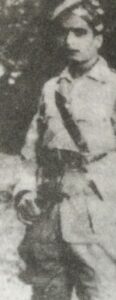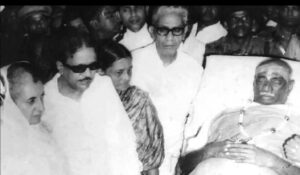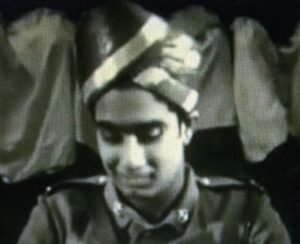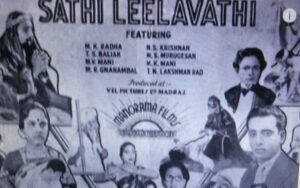Completing Four Decades as a Movie Star
by Sachi Sri Kantha, February 1, 2022

MGR as the Police Inspector (‘Sathi Leelavathi’, 1936)
To the previous part 63, friend R. Kannan’s comments received on December 24th was as follows:
“A very comprehensive account pulling together the various strands neatly. I haven’t seen Dungan’s interview and have also yet to lay my hands on his memoirs. Kudos. It is pertinent that you point out that while Kalaignar lists Manthirikumari as a smasher MGR does not; he lists Marudha Naatu Ilavarasi. We would never know the reason. Other than the discussion on MGR’s moderated mouthing of dialogues I think I would agree with most of the thinking. Delivery was not MGR’s strong suit. He was not [Sivaji] Ganesan or SSR. Good delivery was important through the 1950s I would think. Wasn’t Manohara released in 1954? The [shooting] incident in 1967 further eroded his capability. But the charisma that oozed out of this man was such that he did not have to deliver. His mere presence electrified his fans. A good substantial piece of work piecing together much information in a single strand.”
My response to Kannan’s comment, sent the following day was,
“Yes, you are correct, Manohara (the movie version) was released in 1954. But, it had been acted in stages for years. Even MGR mentions in his book, that when Kali Rathnam took him to meet with Raja Sandow, he had told MGR to act the dialogues of Manohara – breaking the hand chains, and MGR had acted it in front of Sandow. And Sandow had advised him that tears should instantly flow when delivering the first sentence itself, and acted it to him, to show how it is done.
Unfortunately, S.A. Natarajan, who also acted in ‘Manohara‘ movie, lost his lustre, afterwords. He did produce a good movie ‘Nalla Thangai’ (in which he too acted) after that. I have been trying to find out, when did he die. No info is available in the net.
MGR did show glimpses of good delivery, not to Karunanidhi’s lines – but to Kannadasan’s lines in Mahadevi, Madurai Veeran and Nadodi Mannan for historical dramas. That phase passed out, when he took up social roles, from ‘Thirudathe‘.”
Specific Events of 1975
Apart from the release of his 4 movies in 1975 while campaigning against Karunanidhi’s rule, specific political events in India pushed MGR’s feet further into the political arena. Two specific events in 1975 (Declaration of the Emergency by the prime minister Indira Gandhi in June, and the death of Congress leader Kamaraj in October) influenced and strengthened MGR’s position in the political sweepstakes of the Tamil Nadu.
May 6: Opposition leader Jayaprakash Narayan addressed a public meeting at Marina Beach, Chennai. This was sponsored by ruling DMK.
May 9: release of the movie ‘Ninaithathai Mudippavan’ (Oriental Pictures), directed by Neelakantan.
June 12: High Court of Allahabad found prime minister Indira Gandhi guilty of election code violations, in a case filed by Raj Narain, her opponent in the 1971 General election. More serious charges against Indira, including bribery and intimidation were dismissed.
June 25: a mass rally held in New Delhi by the leaders of Opposition. Principal leaders of the Opposition (including Morarji Desai, Jayaprakash Narayan and Raj Narain) were arrested under the Maintenance of Internal Security Act (MISA).
June 26: Declaration of the Emergency, by Indira Gandhi.
June 27: DMK’s executive committee passed a resolution, opposing the Emergency Declaration.

Indira and Karunanidhi with the remains of Kamaraj, Oct 1975
July 4: release of the movie ‘Naalai Namathe’ (Gajendra Films), directed by K.S.Sethumadhavan.
July 16: MGR (with his front rank leaders Nanjil Manoharan, S.D. Somasundaram and H.V. Hande) met Indira Gandhi to inform that his party supported the Emergency Declaration. Manoharan and Somasundaram were Lok Sabha MPs then, elected on DMK ticket in 1971.
Aug 22: release of the movie ‘Ithaya Kani’ (Satya Movies), directed by A. Jaganathan.
Sept 15: Anna Trade Union Movement (of the ADMK Party), established on mentor Anna’s birthday.
Oct 2: death of Congress (O) leader K. Kamaraj.
Oct 31: release of the movie ‘Pallandu Vazhga’ (Udayam Productions), directed by K. Sankar.
Opting for a Maruthakasi lyric to sock Karunanidhi
Lyricist Maruthakasi’s memory in writing to satisfy MGR’s individuality/thinking has been previously translated by me, for a post about Maruthakasi, in Sept.15, 2020. [https://sangam.org/lyricist-maruthakasis-autobiographical-notes/]
This relates to one of T.M. Soundararajan’s dance number for MGR, featured in the movie ‘Ninaithathai Mudipavan’ (1975). When this song was needed, MGR had wished to sock on his friend-turned foe Karunanidhi’s past, ingratitude and political antics. He wanted one, and Maruthakasi did offer one for MGR’s satisfaction. In hindsight, MGR’s appearance in a pink-red colored costume for this song sequence appears garish now; but, that was the practiced trend of those days in Kodambakkam studios [i.e., a color film means all dresses have to be in gaudy colors, not delicately blending with the characters.]. The Youtube link is, https://www.youtube.com/watch?v=8e6LPKddleI
I reproduce that particular segment below.
“there was shooting for ‘Ninaithathai Mudipavan’ (The one who finishes what he thinks). In this movie, Mr. MGR had double role. Two songs for this movie written by other lyricists wasn’t acceptable to MGR. So, they called me. Among these the lyric written by Kannadasan, ‘Naan porantha Seemaiyile Naalu Kodi perunga. Naalu Kodi perkalile, Naanum oru aalunga’, I liked personally. I did tell him that I like this lyric. But, MGR’s response was, ‘Of course, the lyric is good. But, it doesn’t reflect my individuality.’ I asked, ‘Can you explain?’ MGR’s reply was ‘Can’t you see the difference between, ‘Ayirathil Oruvan’ (One in a Thousand)’ and ‘Naalu Kodi perkalile Naanum oru aalunga’ (I’m one among the 40 million)? For 10 minutes, I felt immobilized and couldn’t reply. He is not the old MGR. Every minute, he has been growing. My respect for him and the trust I had in his achievements reached beyond boundaries.
Based on this experience, I wrote the lyric that began with the lyric ‘Kannai Nambathe’ (Don’t believe your eyes). MGR was fully pleased with the lyrics. The next day, he had arrived for the recording. Five minutes before the recording time, he called me alone, and asked me to sing the final lines of the lyrics. I sang. On the lines,
‘Pon porulai kandavudan vantha vazhi maranthu viddu,
Than vazhiye Pohiravar Pohattume’,
[Those who had seen money and material, who opt to forget their past travails,
Let them walk their own path]
He asked me, what is wrong if one opts to walk his own path, if that seems to be the perfect one? For me, this was the second shock. I was filled with the thought that like NSK, this individual seems to be thinking every minute. Because of that, I changed those lines to, ‘….Vantha vazhi maranthu viddu, kan moodi pohiravar pohattume’
[….who opt to forget their past travails, Let them walk their path with closed eyes] With MGR, there have been so many experiences.”
The translated lines of complete Maruthakasi lyrics read as follows:
‘Don’t believe your eyes! It will cheat you -You may be deceived by what you see
Trust your senses – Your mind will clear – It will indicate pointedly – It will not lie.
If protectors don a role, thieves turn in disguise -It’s possible to appear in front of eyes
Waiting to lock the hands of thieves – Cannot be seen now, but it’s for real.
Time will tear away the false image – Then One will learn the true image.
You Swamis – who chant ‘Om Muruga’ – Live like fake religious cats
Like prestigious Lords – by cheating commoners – You smile and frolic
Phonies never gain in the end – Truth never sleep forever.
After finding gold and wealth – Forgetting one’s past strides
Let those blinded folks walk on their own
I know my mind – I wouldn’t forget my bonds
Let what happens happen
Good hearts with gratitude is enough for me – This will do for my assets.’
The lyric lines are nothing but political propaganda for MGR, the politician. Nevertheless, the song shines after four decades due to the eye-catching tune set by maestro M.S. Visvanathan and the up-beat voice of Soundararajan. Ninaithathai Mudippavan movie released on May 9, 1975 set the trend of box office tills ringing for MGR’s other three movies (Naalai Namade, Ithayakani and Pallandu Vaazhga) that followed in that year.
Death of Kamaraj in Oct 2, 1975 and JP’s diary entry of Oct 3, 1975
The death of K. Kamaraj (a former chief minister of the then Madras state, from 1954 to 1963) and its political repercussions was recorded by Jayaprakash Narayan (JP, hereafter) in his Prison Diary. In the entry for Oct.3, 1975 (presented below, verbatim), JP had analyzed the dilemma faced by Kamaraj, in confronting the DMK of Karunanidhi and ADMK of MGR on one hand, and how he was forced to play his cards against Indira’s adventurism in gulping his voter base. JP had used the phrase ‘quadrangular politics of Tamil Nadu’: two parent parties (Congress and DMK) and their two splinter parties (Congress – I of Indira, and ADMK of MGR). In the first attempt of testing their voter strength at the Dindigul by-election of 1973, MGR’s supporters had whipped the other three parties convincingly. But, JP hasn’t bothered to find the ground realities in Tamil Nadu, He had simply recorded what Kamaraj had told him, or what was painted to him by Karunanidhi.
JP’s lengthy diary entry, recording Kamaraj’s thinking, is presented in full, with the exception of the last paragraph:
“Kamaraj died yesterday in Madras of a massive heart attack. A great, even heroic figure of Indian politics is no more. His life’s work was not complete yet. The last time he met me in Delhi, he said something like this: ‘What you are doing is the only hope for the country’. But when I toured Tamil Nadu later, he was not pleased with my speeches. I couldn’t condemn the DMK and call for a struggle against the Tamil Nadu government.
The reason was that Mr. Karunanidhi, unlike the Congress Chief Ministers, offered to meet the Opposition and discuss with them their criticism of the DMK government. He said he was prepared even for an impartial enquiry into their faults, charges of corruption or of any other kind. In fact, he mentioned that in one case he had actually appointed a High Court judge as a commission of enquiry. He also pointed to the Public Men’s Conduct Enquiry Act he had already had enacted and expressed his preparedness to discuss either with me or Opposition leaders any faults that the Act might be found to possess, such as the deterrent punishment provided in it for anyone whom the due process of law, as laid down in the Act, found to have willfully made false charges. Under these conditions, a responsible Opposition was expected to take the DMK leaders at his word and make a serious attempt to take the obvious steps. In fact, in one of my speeches in Tamil Nadu I urged Kamaraj to take up this therapeutic line and clean up the murky political climate in the State.
I am not suggesting that whatever Karunanidhi, Rajaram, Sezhiyan told me in Madras or Delhi had to be taken at face value, or that I took it in that way. But in the absence of any response from Kamaraj and the Opposition it did not seem fair, at least for me, to attack the DMK government and give a call for a people’s movement against it. A people’s movement could still be developed (because, as I have endeavoured to show, it need not in every case be against the government; the latter may honestly cooperate with the movement because its objectives are far wider: a total revolution) but naturaaly Opposition leaders in Tamil Nadu, including Kamaraj, were not interested in any movemet unless at least its immediate political aim coincided with the Opposition’s aim.
For Kamaraj the situation was made more difficult –as compared for instance, with that of MGR because (as he had told me at the Delhi meeting) he didn’t want to weaken the DMK as otherwise the ADMK would be correspondingly strengthened. For Kamaraj, the ADMK was even worse than the DMK. Yet, owing to the national policy of the Congress (O), he did not want to draw the Congress (I) nearer to him. Thus, unlike other states in India, the position of Kamaraj was a Congress (O) leader was a very uncomfortable and delicate one. As he told me he did not trust Mrs Gandhi in the least and vice versa. But in the quadrangular politics of Tamil Nadu, being openly opposed both to the DMK and the ADMK, he had little elbow room to manoeuvre. He knew that an unscrupulous politician like Mrs Gandhi would have no qualms about joining hands with the ADMK and he dreaded that eventuality. So, tentatively his position was to ‘go it alone’ at the next election. He realized that that would be disastrous for his party. However he preferred to wait and see. But for his party’s national policy, reinforced by the Bihar movement and its national repercussions, he would have eventually thrown in his lot with Mrs Gandhi. His position and the options open to him further complicated and narrowed down after the proclamation of the Emergency and the consequent events.
However, death has settled that issue for him. His followers, I am afraid, will break up and disintegrate. Mrs Gandhi by deciding to attend his funeral had already dealt a severe blow to the Tamil Nadu Congress (O)….For the Nehrus it seems politics decide everything!”
Eventually, what JP predicted about Kamaraj’s Congress party in Tamil Nadu came to be true. Few who were aligned to Kamaraj, like G. Karuppiah Moopanar (1931-2001) and Sivaji Ganesan (1928-2001), moved into the camp of Indira’s Congress Party. Few others, like P. Nedumaran (b. 1933) and Kumari Ananthan (b. 1933) went on their separate paths, forming parties of no significance. Another Kamaraj associate, P. Ramachandran (1921-2001) merged the rump Kamaraj’s Congress Party he was leading in post-Kamaraj period with the Morarji-Desai led Janatha Party in 1977. Despite his image as a freedom fighter and ‘the King maker’ in 1960s, character deficits of Kamaraj, as aptly pointed out by poet Kannadasan, contributed to the immediate disintegration of his party, within two years of his death. In this respect, though Kamaraj had a low opinion on MGR’s ability as a politician (as revealed by JP’s diary entry) MGR was blessed. Though 35 years had passed since his death, MGR’s party is still standing on its own.
MGR and Karunanidhi took opposing decisions, related to Indira’s declaration of Emergency in 1975. It is tempting to pose, what could have happened, suppose Karunanidhi opted to side with Indira Gandhi then? Now, we can infer that his Cabinet would NOT have been dismissed by her in January 1976, and he could have continued as the chief minister of Tamil Nadu until 1977. This was one of those historical ‘Ifs’.
MGR might have found dislodging Karunanidhi not so convenient.
I infer that two specific events of 1975, made MGR’s path to the chief minister rank in 1977 easier. First was Karunanidhi’s mis-step in opposing Indira’a decision. Second was, the death of Kamaraj, which eliminated a vibrant rival claimant for chief minister’s title.
Specific Events of 1976
Jan. 31: DMK ministry was dismissed by Indira Gandhi, and President’s rule imposed in Tamil Nadu.
Feb. 14-15: Indira visited Chennai, to declare open Kamaraj memorial.
Mar 18: release of the movie ‘Neethiku Thalaivanangu’ (Umaiyambikai Productions), directed by P. Neelakantan.
May 16: MGR changed the name of his party to All India Anna DMK (AIADMK), from the previous ADMK. This name change received flak from Karunanidhi that MGR was spineless against Indira’s petulance.
July 3-6: DMK’s executive committee meeting, in which Karunanidhi faced criticism for continuing to be the President of the party. In consequence, notable leaders like K.A. Mathiazhagan, Panruti S. Ramachandran, SSR and his brother in law D.V. Narayanasamy were suspended from the party.
May 23: release of the movie ‘Uzhaikkum Karangal’ (K.C. Films), directed by K. Sankar.
Nov 11: release of the movie ‘Oorukku Uzhaippavan’ (Venus Pictures), directed by M.Krishnan Nair.
About what he felt on the political scene during the post-Kamaraj period until the dismissal of DMK government by Indira on January 31, 1976, Karunanidhi had recorded in his autobiography the following:
“Due to the Emergency situation the cordial relationship between the Central government and DMK had collapsed, and [we faced] our government would be dismissed at any time. On January 6, 1976, Sivaji Ganesan joined Indira Congress.
Following the death of Kamaraj, [his] Congress Party split into two. One camp wanted to join Indira Congress for benefits. The second camp wished to retain their own identity, which was the wish of Kamaraj. The Indira Congress folks believed that I was the one who was blocking the second camp from joining the Indira Congress. Due to this, they somehow worked behind the scenes to dismiss the democratic rule in the Tamil Nadu. They went to Delhi repeatedly to complain about the DMK rule, and to expand and spread the silly grudges/rumors of local speakers to the prime minister. The message was, I was the one who keeps blocking the union of two Congress parties. Due to this, Central Minister Om Mehta made such announcement in the parliament. I refuted this charge, very next day itself and sent letters to the prime minister.”
Why I specify this here? Karunanidhi didn’t accept the claims made by MGR’s camp that his government was dismissed due to the corruption charges handed to the Central government by MGR in late 1972. He blamed the role played by the disgruntled segment of Kamaraj followers who had joined Indira Congress, after Kamaraj’s death. Nevertheless, Karunanidhi had recorded the following as well:
‘When asked about his opinion on the dismissal of DMK government, M.G. Ramachandran responded ‘Dismissal of DMK government is a courageous act. ADMK welcomes it. To protect democracy, ADMK offers total support to prime minister Indira Gandhi. At the Legislative Assembly of 234 members, DMK had a strength of 167. [But] MGR [ignored this] said that’s an act of protecting democracy. The Governor’s report on ‘Why I recommended dissolution of DMK government?’ was submitted to the parliament on Feb. 2nd. In the parliament, in addition to DMK, other parties Communist Marxist Party, Congress (Old) Party, Socialist Party and Indian People’s Party expressed their opposition.”
Four Decades as a Tamil Movie Star
1976 marked the four decades of MGR’s career as a Tamil movie actor. This was a first of it’s kind for a ranking Indian movie star, of his period. From 1936 to 1976, a total of 1,867 Tamil movies were censored and released. MGR had acted in 129 of these movies (6.9% of released Tamil movies). See the Table, provided in a PDF file.

MGR – a still, from his debut movie, Sathi Leelavathi (1936)
Excluding the early 20 movies, in which he appeared in either subsidiary roles or villain roles, MGR had appeared as the hero in 109 movie, between 1947 and 1976. Since 1950, he would never allow his hero rank to descend. In holding his hero rank, Lady Luck had smiled on MGR twice, by eliminating his rivals from Chennai, at opportune times. (1) untimely death of his elder P.U. Chinnappa in 1951 (2) multi-talented rival Ranjan’s (1918-1983) ill-fated option to move to Hindi movies in early 1950s. Some cynics may also mention that, Lady Luck smiled on MGR for the third time in 1967 – had he succumbed to M.R. Radha’s bullets in 1967, MGR would have been history, five days prior to his 50th birthday. This is, only for MGR’s movie career. Later, Lady Luck wouldn’t desert MGR in 1980 and 1984, in his political career as well to the dismay of his rival Karunanidhi.
The travails MGR faced for playing his debut role as the police inspector in the ‘Sathi Leelavathi’ (1936) movie, directed by Ellis R Dungan, had been described in more than three chapters of his autobiography. In fact, it was the third option, he was offered– downgraded from the investigator role (played by M.V. Mani Iyer) and the friend of the hero (played by Nammalvar). MGR’s name was not included in the movie poster. The names listed in the poster were, M.K. Radha (hero), T.S. Baliah (villain), M.V. Mani, M.R. Gnanambal (heroine), N.S. Krishnan, M.S. Murugesan, M.K. Mani and T.N. Lakshman Rao.
Among those listed, only three became household names in Tamil movies. M.K. Radha (1910-1985), N.S. Krishnan (1908-1957) and T.S. Balaiah (1914-1972). M.V. Mani and Nammalvar, the two actors who were chosen, in preference to MGR, failed to make a grade in the future. Among the three who did, N.S.Krishnan died prematurely in 1957, M.K. Radha’s acting career ended in 1958, after 22 years. Only Balaiah continued to act till 1970, consecutively for 34 years. As I understand, the negatives of Sathi Leelavathi (1936) have been lost to history. Only some clips related to the shooting of this movie remains preserved. Vembar Manivannan had compiled a little more than 3 minutes video, offering a single song ‘Theyilai Thottathile’ [In the tea gardens] by Musiri Subramanya Iyer, which is posted in the Youtube. The link is,
https://www.youtube.com/watch?v=ubnbQ6a8y58

Sathi Leelavathi (1936) movie poster
What British stage and movie star Sir Laurence Olivier (1907-1989) recorded in his autobiography, about success as an actor deserves attention. “I would now say that there is an equal trinity of contributing qualities.
Talent: This must develop into skill.
Luck: Though this must vary, it must be good enough to believe in the truth of it yourself. You must see that it has provided you with the right opportunities at the right times.
Stamina: a gift seemingly not affected by disease, unless worn down by constant onslaughts.”
For interested movie fans, I provide the following statistics about Olivier’s record as a movie star. Between 1930 (‘The Temporary Widow’) and 1984 (‘The Jigsaw Man’), a span of 54 years, Olivier appeared in only 55 movies; in significant numbers, NOT as a hero. But, his peak performance were for 42 years, between 1936 (‘As You Like It’) and 1978 (‘The Boys from Brazil’). Olivier’s debut movie performance in ‘The Temporary Widow’ was akin to that of MGR’s in 1936. He had remembered it as, ‘This was the first film I appeared in – except for one day’s work as an extra for a much needed guinea in 1925 at Cricklewood.’ A guinea (now an obsolete currency in UK) was an equivalent of 1.05 pound sterling.
What Olivier meant by ‘success’ hints at longevity in the profession as well. MGR was blessed with all three qualities for success, listed by Olivier. Though it took almost a decade for Lady Luck to smile at him, once her munificence reached him, MGR never took a false step to disabuse her blessing. In contrast, comedian N.S. Krishnan (one of MGR’s mentors) had abundant talent and luck, but by disabusing stamina, he died young.
*****
Cited Sources
Maruthakasai A: Thirai Kavi Thilagam Poet A. Maruthakasai Padalgal, Parani Pathippagam, Chennai, 1986, pp. 14 – 24.
Kannan: MGR – A Life, Penguin Books, Gurgaon, Haryana, 2017, pp. 208-222.
Karunanidhi M. Nenjukku Neethi, vol. 2, chapters 63-72, Thirumagal Nilayam, Chennai, 1985, pp. 461-533.
MGR: Naan Yaen Piranthaen?, vol. 1, chapters 20 – 24, Kannadasan Pathippagam, Chennai, 2014, pp. 286-342,
Laurence Olivier: Confessions of an Actor, Coronet Books, Hodden and Staughton Ltd., London 1982.
Jack Vermilye: The Complete Films of Laurence Olivier, Carol Publishing Group, New York, 1992.
Another wonderful episode on MGR’s legendary life. Thanks Dr. Sachi, even though all the details are amazing, I was awestruck by MGR’s influencing of lyrics to suit his political agenda. It perfectly explains his success as undisputed leader of Tamils till his death.